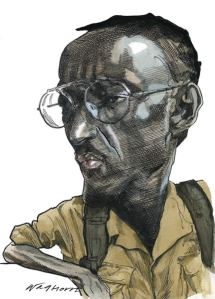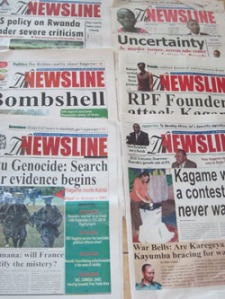Media coverage in Rwanda has faced many challenges since the tragedy of the 1994 genocide. Rwandan President Paul Kagame allows very little, if no freedom of the press. Such media outlets as The Economist, The BBC and other publications have expressed their plight to freely express their views of the country and its government. The Committee to Protect Journalists (CPJ) has worked to expose this censorship.
“Any critical news coverage had been squashed”, according to the CPJ. What did eventually make it to the papers was the coverage of Kagame’s contenders, many of who were somehow tied to him politically and posed no real competition, as they did not truly challenge his agenda. Clearly, the Rwandan government has something to hide.
According to the CPJ, 17 journalists have been killed in Rwanda since 1992. This past April, Rwandan independent publication Umuseso faced 6 months of suspension and the paper’s editors faced criminal charges. Charles Kobonero, one of the editors for Umuseso, was formally charged with “public insult” back in 2006 after writing a series of articles criticizing Kagame’s government. Though charges of “divisionism” were eventually dropped, Kobonero still faced a harsh sentence for bringing attention to the network of political influence within the Rwandan government.
According to the CPJ, editors cannot publish if they have a criminal record under Rwandan law. As conditions grew to be more perilous, the editors were ultimately forced to publish from exile and created a new publication called Newsline. Attempts by the government were made to block the paper from getting into the hands of the Rwandan people. Despite the difficulties, copies managed to be downloaded from emails and circulated.
It would seem that despite Rwanda’s great progress, Kagame’s government continues to roadblock transparency. One could argue that this kind of governing is necessary to gain complete control over a rather chaotic and violent period of time in Rwandan history. But to what extent should the government continue to rule with such an iron fist? Rwanda continues down a path of prosperity and has made great strides toward a future free from violence, crime and racism. Does this mean that freedom of press and freedom of expression must be sacrificed?



I very strongly oppose the idea that freedom must be sacrificed for prosperity. In fact, studies have shown, and it is generally accepted as truth, that democratic freedoms (including press freedoms) are highly correlated with economic prosperity. I think that Rwanda has shown improvement IN SPITE OF lack of freedom, not because of it.
Democratization is never easy, and it often can result in violence as groups compete and elites fear losing power, and so the way in which we promote such freedoms is important so as not to disrupt the positive strides made in Rwanda. Done appropriately and slowly, I think that improving democratic freedoms and press freedoms will actually have a positive impact on development efforts in the country.